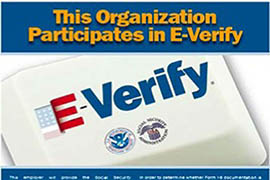Closed to business: Government shutdown shutters E-Verify

Cronkite News
WASHINGTON – Arizona law requires that employers check the citizenship status of new hires against E-Verify, but anyone who tried to log in to the federal database Tuesday got a shock.
E-Verify is closed to business.
The federal database, run by the Department of Homeland Security, was one of the casualties of the partial shutdown of the federal government after Congress failed to approve a budget for fiscal 2014, which started Tuesday.
Arizona is one of several states to mandate that all employers run new hires through the free web-based federal program, which checks whether employees are eligible to work in the U.S.
So Tuesday’s message – “E-Verify is currently unavailable due to a government shutdown” – left many Arizona employers and employer associations unsure how to proceed with hiring in the near future.
“We don’t know how we’ll be able to hire,” said Brian Turmail, spokesman for the Associated General Contractors of America.
State prosecutors, too, were surprised that the service had gone dark, but said they did not expect any prosecutions as a result. And an employment lawyer in Phoenix said she expects little to change, except that it will take longer for businesses to get a thumbs-up or thumbs-down on a new hire’s status from the federal government.
Julie Pace, the attorney, said that companies would still be able to hire new employees as they had before E-Verify was shut down. Under the E-Verify system, she said, an employer only checks an employee’s eligibility to work legally after first hiring the person.
“Until you get the ‘non-confirmed,’ they (new hires) can work,” Pace said. “You can hire, you can do I-9 forms, you can run everything, it just means no one will answer you in the government.”
She said she would encourage companies to do things as they normally would when hiring, and just wait for the government to get back to work.
When that will be is unclear. On Tuesday, the E-Verify website notified visitors that during the shutdown there would be no action on new companies trying to enroll in E-Verify, on verification of employment eligibility, or on viewing or taking action on any case.
The E-Verify website said it would “provide additional guidance once we reopen.” Until then, it said, employers will still need to complete I-9 forms within three days of an employee starting to work, although time periods for disputes will be extended until after the government is up and running.
Maricopa County Attorney’s Office spokesman Jerry Cobb said the office had not discussed the E-Verify shutdown, but that he does not expect any charges to come from it.
“It is unclear what impact this will have on employers at this point,” Cobb said
Amelia Cramer, chief deputy in the Pima County Attorney’s Office, said “county attorney offices are authorized to investigate reports of violations” of the Legal Arizona Workers Act, the law that requires use of E-Verify. But she said Pima County only investigates when someone reports that an employer is not using the system and is knowingly hiring people ineligible to work in the the U.S.
But Turmail said the uncertainty comes at a bad time. The construction market is just starting to improve in Arizona, he said, and not being able to run E-Verify might be problem for contractors who are gearing up for big construction projects.
“Worst case scenario is pretty bad for the state’s economy,” he said.
Garrick Taylor, a spokesman for the Arizona Chamber of Commerce, said closing down E-Verify could slow down hiring in the state.
“Just one more example of the harm that can be caused by a federal government shutdown,” Taylor said.
The steps to verifying, under the Department of Homeland Security’s E-Verify system, that a new hire is legally able to work in the U.S.
• E-Verify checks both U.S. citizens and non-citizens. It can only be used to verify the eligibility of new hires, not job applicants. • E-Verify must be used in a non-discriminatory manner. If used, it must be used on all new hires, regardless of citizenship or immigration status. Employers using the system must inform all new hires of that and must display E-Verify posters in the workplace. • After a new hire completes an I-9 form, the employer enters information from that form, plus a Social Security number and a List B form of photo identification into the E-Verify system. • If the information entered matches with E-Verify, the new hire is eligible to work without any additional confirmation. • If not, a tentative non-confirmation, or TNC, is issued. The employer must notify the employee of the TNC; the employee can quit immediately at that point, or move to contest the TNC. • It is the employee’s responsibility to contest the TNC. The employee has eight federal workdays to contest the notice. If the employee fails to contest the TNC within the eight-day period, their employer must fire the worker. • If the employee contests the notice, the employer must supply him an E-Verify referral letter that lists his rights, how to contest the TNC and how to contact the government agency that will consider the claim. • A TNC is to be kept private between the employer and employee. Until the challenge is finalized and a decision is issued, the employer cannot reduce or withhold the worker’s pay, cut his hours, delay job-related training or be fired. If they are, an employee who is later verified can seek back pay or reinstatement. • If the employee’s status is confirmed after a TNC challenge, a verification is issued and the employee can continue working. • If a final non-confirmation is issued, the employee must be fired immediately.















